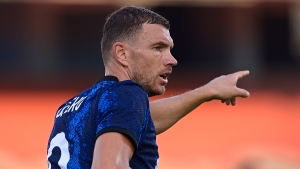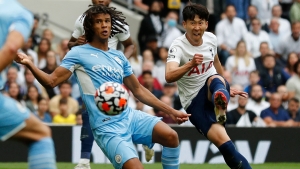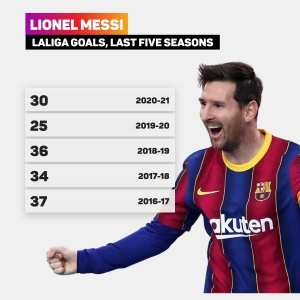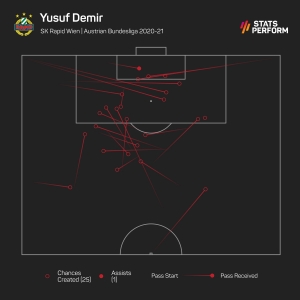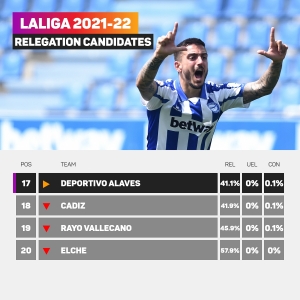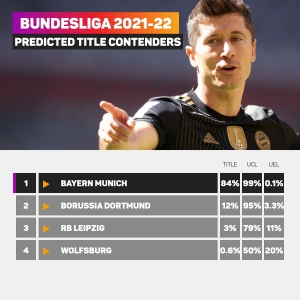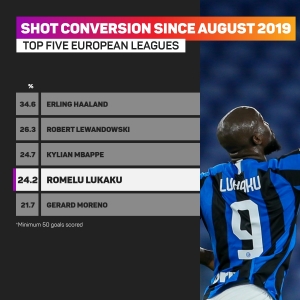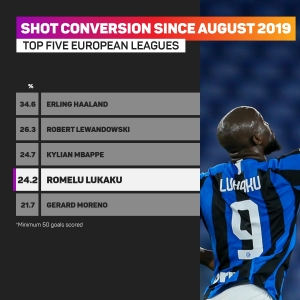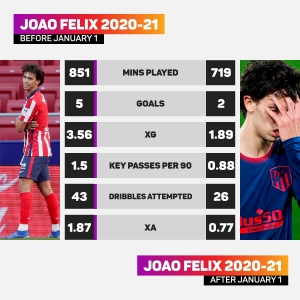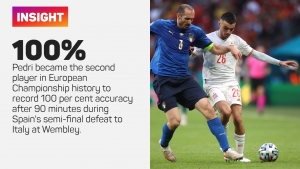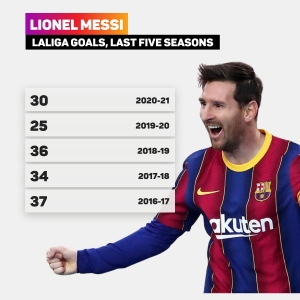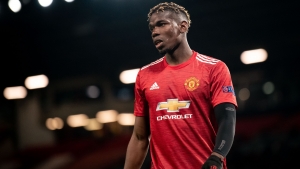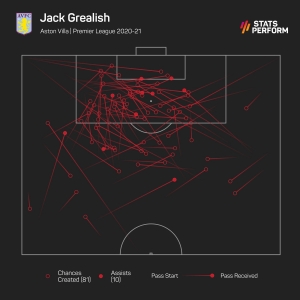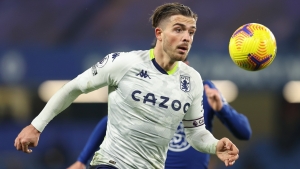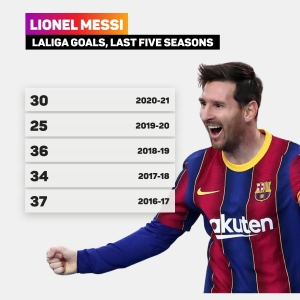To paraphrase the apocryphal question asked of Abraham Lincoln's widow, "Aside than that, Mr Laporta, how was the lunch?"
When Lionel Messi jetted into El-Prat last Wednesday, it was to complete the formalities of a long-awaited contract extension that would commit him to the club of his life for the rest of his career.
At least, that's what the six-time Ballon d'Or winner and pretty much everyone else thought until he sat down for lunch with club president Joan Laporta on Thursday. After that, all hell broke loose.
"We had everything agreed but, at the last minute, it couldn't happen," he said at his tearful Sunday news conference, with the rampaging shambles of Barca's financial, internal and political affairs having put paid to the best laid plans.
Messi is now a Paris Saint-Germain player. It will be a jarring thing to type and read for some time, and the claims, counter-claims and recriminations over how Barcelona allowed things to reach this point of collapse will rumble on for some time.
It feels like a barely relevant sidenote that four days on from their greatest ever player addressing the media and being paraded around Paris, Barcelona will host Real Sociedad to begin their LaLiga campaign. What, if anything, can Ronald Koeman and his players salvage from the wreckage?
The Barcelona Way
The delayed election campaign that secured Laporta's return to the top job – his initial term between 2003 and 2010 having overseen the transformative tenures of Frank Rijkaard and Pep Guardiola – was a fraught one for Koeman.
Victor Font, one of Laporta's rival candidates, pledged to bring in club great Xavi if he was successful, while the eventual winner's support for Koeman was tenuous and conditional at best.
After a chaotic 2019-20 season, where Ernesto Valverde's lamentable sacking cleared the way for Quique Setien to surrender LaLiga to Real Madrid and oversee the humiliating 8-2 defeat to Bayern Munich in the Champions League quarter-finals, Koeman was not a universally popular choice and easily viewed a stop-gap appointment.
Whereas Messi wanted to stay but had to leave this time around, last August he wanted to leave but had to stay – relations with Laporta's predecessor Josep Maria Bartomeu having broken down. On the field, the Blaugrana were inevitably a little bit all over the place.
But after a chastening 2-1 loss to Cadiz on December 5, Barcelona and a rejuvenated Messi went 19 games unbeaten in LaLiga. It was almost enough for an unlikely title success, but the run ended with a 2-1 defeat away to Real Madrid on April 10.
Koeman lost both Clasicos and his Barca only took a point from Atletico Madrid, failing to score in either game against the eventual champions. There were heavy Champions League losses to Juventus and PSG, and Koeman's record in big games was and is an obvious concern.
Yet, it was fairly bizarre to see the Dutchman treated with such disregard during the electioneering, which ran parallel to the long undefeated streak. After tinkering with various formations earlier in the season, Koeman had settled upon a 3-4-3 in which his team thrived.
Nevertheless, in May, it was reported by Mundo Deportivo that Laporta demanded Koeman commit to Barca's classic 4-3-3 and brand of football married to the club's traditions. A stay of execution would be dependent upon one of Johan Cruyff's former disciples committing to the Barcelona Way.
Back to the future
Looking at their performances from last season, it is easy enough to spot elements of classical Barcelona in Koeman's side.
They scored the most goals in LaLiga and had the highest expected goals (xG) figure of any team, indicating they cumulatively created a better quality of chances than their rivals.
The way they got to this point was also very Barca.
No side in LaLiga had a higher average sequence time than the Blaugrana's 14.27 seconds, while their average of 5.52 passes per sequence was also a league best. They were the only team to average above five.
In terms of sequences featuring 10 or more passes, they were streets ahead with 910. The next most 10+ pass sequences came from Madrid with 662. As a consequence, Barcelona also ranked top for build-up attacks – open-play sequences of 10 or more passes that end either with a shot or a touch in the opposition box.
Now as then in the glory days of Guardiola, you spend a lot of time chasing the ball against Barcelona.
Pedri enjoyed a breakout campaign so good he's only just been allowed to finish it, shining for Spain at Euro 2020 and the Olympic Games, while the evergreen Sergio Busquets ticked away in his customary style to average 95.52 passes per game. The next best midfielder in LaLiga on that metric was Madrid's Toni Kroos on 85.76.
Frenkie de Jong developed a knack of chiming in with some important goals from midfield after the turn of the year, while also showing his versatility by slotting into the back three when injuries and circumstances required.
Consider the presence of Riqui Puig and teenage sensation Gavi and the "take the ball, pass the ball" part of the Cruyffian legacy remains in safe hands, albeit with the fairly large assumption that there remains room for all of them on the accounts.
Pressing concerns
The other key facet of the teams in which Messi rose to his place at the top of the world game was their work without the ball.
Teams being at their most vulnerable in transition is now an accepted reality of the modern game, but Guardiola's Barcelona swarming opponents as soon as they lost the ball altered perceptions of what was required of elite teams in terms of intelligent commitment to the cause.
Barca operated under their six-second rule, which had nothing to do with anybody dropping food on the floor. They attempted to retrieve possession within six seconds of losing it via immediate and intensive pressing. If this was not possible, they would fall back into a defensive shape to guard against opponents now settled in possession and more able to play through the press.
Pressing methods and teams' aptitude in dealing with them have obviously evolved since Barcelona scared the life out of European football a little over a decade ago, but the principles remain. If a team wishes to play a high-possession game with a high defensive line, their defending from the front as to be impeccable.
In 2020-21, Koeman's side were merely quite good in this regard. Passes per defensive action (PPDA) is a metric that indicates how well a team presses. The lower the average number of passes an opponent is allowed to make outside the pressing team's defensive third before being met with a defensive action – such as a tackle, interception or a foul – the better the press.
Barca's 10.6 PPDA put them sixth best in LaLiga last season, below Celta Vigo, Real Sociedad, Sevilla, Getafe and Real Betis. Although they scored the most goals from high turnovers (seven), this can be attributed to the sharp finishing of Messi and others, as their 37 shot-ending high turnovers were only the eighth highest.
They are not numbers that suggest Laporta's fantasy of seeing a whirring 4-3-3 back in motion is one grounded in reality. By comparison, Luis Enrique's "MSN" Barca of 2014-15 averaged a staggering 7.0 PPDA. Had Messi remained, his capacity to do this sort of work is diminished, but that is now a puzzle for Mauricio Pochettino to solve.
Messi's great friend Sergio Aguero is one of the attacking reinforcements, although a calf injury means he will be sidelined for 10 weeks. If the masterful Argentina striker's body still allowed him to press with suitable intensity, he would probably still be with Guardiola at Manchester City.
Memphis Depay is fit to start the new season and some of the onus will fall upon the Netherlands international to sharpen Barca up a little.
He comes from a Lyon side who forced more shot-ending high turnovers than any other in Ligue 1 last season (62), while his 25 instances of winning possession back in the final third placed him joint fifth among forwards in the French top-flight.
Antoine Griezmann won the ball 24 times deep in opposition territory last term in LaLiga, alongside 37 tackles and 100 recoveries, all of which were highs among Barca forward. He and Depay could certainly prove a useful nuisance in tandem.
Getting on with the job
Of course, it is not entirely certain Barcelona will be able to register Depay with LaLiga in time to face Real Sociedad, such is their parlous financial state.
Laporta claims this will not be a problem. But then, he said he'd re-sign Messi and essentially ran for election on a pledge he spectacularly failed to fulfil.
If it turns out Barca passed up on Messi because they decided to reject LaLiga's deal with CVC Capital Partners and its associated cash injection in favour of remaining in cahoots with Real Madrid and Florentino Perez's doomed Super League project, it's unlikely holding Laporta to account over whether or not Koeman plays 4-3-3 will be the top of anyone's agenda. It should be noted Madrid president Perez said it was "impossible" for him to have had such an influence, in response to allegations levelled by former Espai Barca Commission member Jaume Llopis.
One of the major reservations surrounding Koeman's appointment was whether he was the man to win Messi more Champions Leagues, with the clock ticking on the great man's career.
This might feel like an absurd grasp for positives and Koeman would be better off if the greatest player of all time was in his squad, but he is at least without one of the big over-arching narratives that Barca have specialised in both constructing and crushing themselves with over recent years.
Valverde was saddled with "only" winning LaLiga as European glory painfully slipped away. If Koeman can wrest back domestic control in these conditions, it would be recognised as a brilliant achievement in its own right. The atmosphere among fans back in Camp Nou might be perilous in the initial post-Messi weeks, but a few wins will place a defiant siege mentality within reach.
Since Cruyff was appointed head coach in 1988, this will be the first season without the late Dutch master, Guardiola or Messi – those three giants of the modern Barcelona – having any active association with the club. It is time for an institution on its knees to let go and turn the page.
Koeman put together a team that functioned well amid considerable turbulence last season and should be allowed to improve upon that template with the fine players that still remain, free from any Mes Que Un Club self-flagellation as Laporta tends to the dumpster fire he inherited and chucked a vat of petrol all over last week.
























